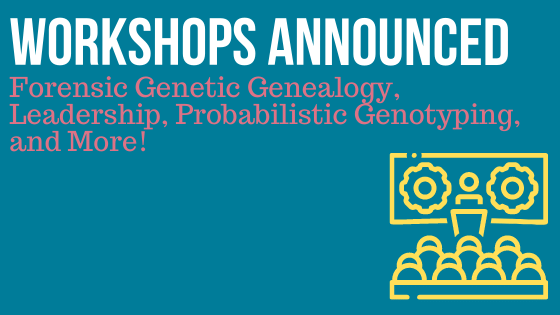Registration is now open for the world’s biggest symposium focused on DNA typing for human identification.
You can also participate in one of ten workshops offered before and after the ISHI general session. Workshops will appeal to both seasoned forensic professionals, newly minted DNA analysts, and those in the forensic genetic genealogy field.
On Sunday, the morning begins with a full-day interactive workshop called “Sherlock in Your Homes: Solve a Crime with IGG”. This workshop is led by Colleen Fitzpatrick, president and founder of Identifinders International and will instruct attendees on how to use crime scene evidence, investigative leads, and DNA profiles to solve a simulated crime using Investigative Genetic Genealogy (IGG). Also in the morning is a free of charge workshop hosted by AABB, addressing AABB accreditation related topics such as Relationship Testing Standards, proficiency testing, validations, and calculations.
This year we’ll have two workshops presented entirely in Spanish. The first offering is the “Mixture Interpretation Workshop” held on Sunday afternoon. Attendees will Attendees will be provided with validation samples to be used under their own standard operating procedures followed by how those same samples are interpreted at the Houston Forensic Science Center Lab using our standard operating procedures.
There are three full-day workshops offered on Monday, with the first being “Applying a Casework Assessment and Interpretation Approach to Probabilistic Genotyping Results.” Co-chairs Mike Coble and Jo Bright bring a wealth of knowledge and expertise to the subject and are excellent presenters. This workshop will give the audience an introduction to casework assessment and interpretation (CAI) approaches for reviewing the outputs (including the likelihood ratio) and diagnostics of probabilistic genotyping software used for the analysis of forensic DNA mixtures. CAI methodology is a formal model for the evaluation of evidence in a balanced, logical, robust and transparent manner.
Being in a leadership position can always be tough, but leading in the forensic DNA field has a unique set of challenges. Workshop chair, John Collins, a high-stakes leadership consultant and executive coach at Critical Victories has recruited some fabulous speakers to present “The New Superior – A Better Way to Be in the One in Charge Workshop”. In this workshop, facilitators will challenge what it means to be a superior and encourage participants to develop new attitudes and strategies for being more effective and trustworthy in how they lead and manage their people. Participants will undergo a Gallup Global Strengths assessment and learn how their individual strengths create both advantages and disadvantages in how they interact with a wide variety of people, including scientists, criminal justice professionals, and police commanders. Through expanded self-self awareness, our attendees will grow their effectiveness as leaders working in the complex arena where science meets the arbiters and enforcers of law.
Those interested in IGG will be pleased to see another full-day workshop offering on Monday. “Investigative Genetic Genealogy: A Comprehensive Review” is led by Danny Hellwig of Intermountain Forensics Laboratory and features several presenters who are experts in the field. The purpose of this workshop is to provide a comprehensive overview of the process of investigative genetic genealogy from lab to investigation. This will entail a deep dive into the instrumentation used (microarray, next gen sequencing, whole genome sequencing), bioinformatics used to transform that data, the databases utilized and the process of investigation that genetic genealogists use. The forensic community is new to this process and this workshop is intended to provide clarity to the community.
There will be four workshop offerings on Thursday afternoon after the conclusion of the General Session presentations, including a workshop designed for and led by Technical Leaders. Bruce Budowle chairs a workshop exploring how next-generation sequencing (NGS) can obtain more information, provide more investigative leads, and reduce the backlog in “Using Next-Generation Sequencing (NGS) to Improve Sexual Assault Investigations. A panel of experts will discuss (1) the strengths and limitations of CE and NGS, (2) the value of Y-STRs and SNPs for short and long range familial searches, (3) options for STR and SNP mixture deconvolution, and (4) data interpretation and validation studies to enable seamless implement NGS for sexual assault resolution.
Tiffany Roy, a consultant with ForensicAid, LLC, returns again this year to present “Implementation of Information Management Tools in DNA Casework”. This workshop will introduce practical tools for practitioners to implement information management procedures using the Linear Sequential Unmasking-Expanded approach. The workshop will begin with a background presentation on key concepts in human factors and the importance of information management in forensic casework. The introduction is followed by group activities on the general human factors concepts. Once the general concepts have been covered, presenters will cover concepts specific to linear sequential unmasking and linear sequential unmasking-expanded and other impact mitigation techniques for cognitive bias in forensics. A practical tool for implementation of LSU/LSU-E will be provided and the participants will be divided into groups. Each group will work through examples using the worksheet to classify different types of information/communications which could be encountered in casework. The groups will practice documenting and categorizing information based on biasing potential, subjectivity, and task relevance. Participants are encouraged to bring examples of communications or information received in their past casework or communication logs from closed cases to practice with the worksheet. Following the practical exercises, there will be a discussion to compare and contrast how the participants classified each piece of information and and time for any questions that may have come up.
The annual Grupo Cientifico Latino-Americano de Trabajo Sobre Identificacion Humana will be chaired by Ronaldo Carneiro da Silva Junior, custodian of the National DNA Database in Brazil. This workshop is also held entirely in Spanish and a description will follow.
Costs and specifics for each workshop (including which workshops are offered virtually) can be found on our agenda page. Workshop space is limited, so don’t procrastinate if you hope to secure a place.
WOULD YOU LIKE TO SEE MORE ARTICLES LIKE THIS? SUBSCRIBE TO THE ISHI BLOG BELOW!
SUBSCRIBE NOW!


